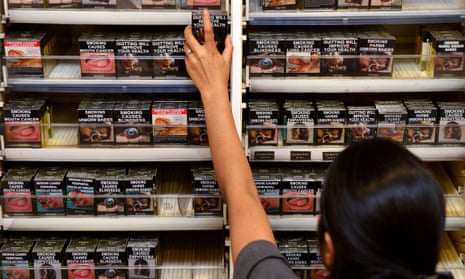Major tobacco companies are giving Australian retailers cash payments and taking staff on all-expenses-paid international trips, including to sports events such as the World Cup, in return for the promotion of their products directly to customers and more prominent cabinet space.
The damning findings from the University of Sydney, published in the international journal Global Public Health, reveal the way tobacco companies use covert marketing tactics to exploit loopholes in Australia’s strict tobacco control laws.
Researchers led by the university’s Christina Watts interviewed 10 former Australian employees from tobacco companies operating in Australia. All had worked for the companies within the past five years in sales or marketing roles.
“We were aware of some of the tactics they were using, but the extent of the incentives and the resources that were allocated into this channel of marketing was quite a surprise,” Watts, who also works in tobacco control policy at Cancer Council NSW, said.
“It undermines legislation like plain packaging by incentivising retailers to promote products and features in the products to customers, for example that a product might have a menthol capsule in it.”
A spokesman for the federal health minister, Greg Hunt, said the minister was concerned by the findings in the study.
“The minister is deeply concerned by tactics used by the tobacco industry to try and undermine Australia’s tobacco policy and overall public health,” the spokesman said. “The government is committed to achieving a 10% smoking target by 2025.”
In countries with bans on tobacco advertising and promotion, tobacco companies have focused their promotional expenditure on business-to-business relationship marketing activities aimed at retailers. However, Watts said evidence of such activities to date has been obtained through secondary sources only, including through analyses of tobacco industry documents.
Watts used the social networking website LinkedIn to find staff who had recently worked at tobacco companies in Australia and asked them directly about how the products were being promoted. These former staff were referred to in the study as “informants”.
“Informants … described incentives programs whereby top-performing retailers were taken on all-expenses-paid vacations,” the study found.
Destinations included Hawaii, the Top End of Australia, Japan, Monaco for the Formula One Grand Prix and to the World Cup and the Rugby World Cup.
During these trips, retail staff were sometimes offered training in how to reach sales targets and how to become tobacco brand ambassadors, the research found.
Informants also spoke of offering payments to retailers to control stock or the positioning of brands on the price boards or within the display cabinets. One study participant reported that Coles and Woolworths would try to “fill the gap” in their profit margins by asking for bigger rebates in return for prime positioning of tobacco brands on the price board.
“All informants reported that financial incentives are used by tobacco companies to drive sales and meet targets,” the study found. “Incentives included rebates for a set number of cigarette sticks sold (such as per 1,000 sticks), cash payments, volume-based price discounts and buy-downs (a price discount whereby the entire price reduction is passed onto the customer).”
In a statement, Coles told Guardian Australia that it “follows and abides by all state and federal legislation with regards to the sale of tobacco”. A Woolworths spokesman said: “The dissemination of information on tobacco products is heavily regulated and we comply with all of our obligations in each state and territory we operate in.”
“Price boards provide customers with access to basic information on tobacco products so they can make informed choices before deciding to make a purchase,” he said.
One informant told the researchers that the tobacco company they formerly worked for allocated roughly $200m towards indirect marketing strategies aimed at retailers. The informant said: “When you think about the margins that tobacco have and the fact that they can’t advertise, all that money goes into incentivising the retailer.”
Another informant described how “tobacco advertising is just illegal everywhere ... It’s an absolute nightmare for tobacco companies in terms of branding and advertising now. But even though you can’t advertise … … you can discount your products. You can provide rebates or you could also just give a wholesale discount price. And that’s how tobacco companies can help the tobacco retailers push particular products or work towards targets.”
Study supervisor Dr Becky Freeman from the University of Sydney’s faculty of medicine and health said changes to the current tobacco advertising, promotion and sponsorship laws are urgently needed in Australia.
“Tobacco companies appear to be exploiting current laws by using the retail environment as an indirect channel to reach consumers,” she said.
“By only restricting tobacco marketing practices aimed directly at consumers, Australian legislation has failed to respond to the importance of retail marketing in the promotion of tobacco. We’re calling for Australian laws to be strengthened to prohibit all marketing of tobacco products – with no contributions allowed of any kind to any event, activity, or individual.”
Do you know more? melissa.davey@theguardian.com
